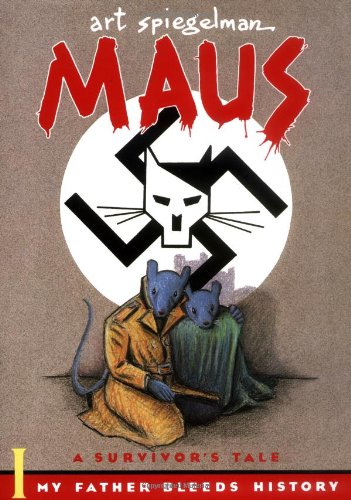
A story of a Jewish survivor of Hitler’s Europe and his son, a cartoonist who tries to come to terms with his father’s story and history itself.Some historical events simply beggar any attempt at description–the Holocaust is one of these. Therefore, as it recedes and the people able to bear witness die, it becomes more and more essential that novel, vigorous methods are used to describe the indescribable. Examined in these terms, Art Spiegelman’s Maus is a tremendous achievement, from a historical perspective as well as an artistic one.
Spiegelman, a stalwart of the underground comics scene of the 1960s and ’70s, interviewed his father, Vladek, a Holocaust survivor living outside New York City, about his experiences. The artist then deftly translated that story into a graphic novel. By portraying a true story of the Holocaust in comic form–the Jews are mice, the Germans cats, the Poles pigs, the French frogs, and the Americans dogs–Spiegelman compels the reader to imagine the action, to fill in the blanks that are so often shied away from. Reading Maus, you are forced to examine the Holocaust anew.
This is neither easy nor pleasant. However, Vladek Spiegelman and his wife Anna are resourceful heroes, and enough acts of kindness and decency appear in the tale to spur the reader onward (we also know that the protagonists survive, else reading would be too painful). This first volume introduces Vladek as a happy young man on the make in pre-war Poland. With outside events growing ever more ominous, we watch his marriage to Anna, his enlistment in the Polish army after the outbreak of hostilities, his and Anna’s life in the ghetto, and then their flight into hiding as the Final Solution is put into effect. The ending is stark and terrible, but the worst is yet to come–in the second volume of this Pulitzer Prize-winning set. –Michael Gerber

Ignore the ramblings of the PC watchdog reviewers. First of all, if you’ve read or are reading the other reviews, ignore the blather about how the whole “Animal Farm” metaphor–Jews as mice, Germans as cats, etc..–being racist and demeaning.
Explanation of the Animal Portrayals As a history and literature major, I wrote my senior thesis on Maus and Maus II because, after reading them for a class, I couldn’t stop thinking about them. The imagery, both drawn and implied, was masterful. Each panel tells the story of the Holocaust as SOMEONE REMEMBERS IT. Spiegelman took his father’s story and graphically interpreted it in an incredibly moving way. He did not write a work of historical fact (for whatever those books are worth anyway – even history is a work of memory and…
Raw, Painful and Personal. This is a powerful work. The tale of a young man’s painful relationship with his father is elegantly interwoven with the father’s recollection of life as a Jew in Nazi-occupied Poland. Spiegelman’s skill and honesty make this a raw, gut-wrenching read, though the tale is somehow ultimately uplifting.